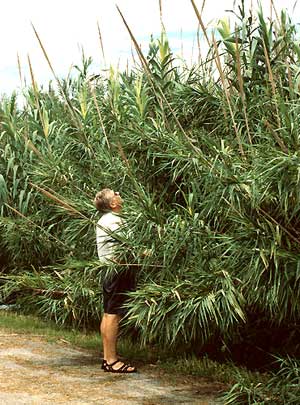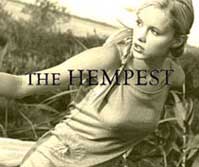Nations first commercial biomass to energy deal struck
In what is perhaps the nation's first commercial application to convert biomass to energy a small Florida firm Monday signed a 25 year contract with N Carolina based utility giant Progress Energy Florida to deliver electric power produced from a renewable agricultural resource.
 Biomass Investment Group plans to build a 130-megawatt power plant, producing electricity not by burning oil or natural gas but grass grown on a 15,000-acre farm. Don't start saving your lawn clippings however the fuel used in this process is called Arundo donax or "Giant Reed", which is similar to bamboo and grows rapidly, 5 cm per day, to nearly 3 meters in height.
Biomass Investment Group plans to build a 130-megawatt power plant, producing electricity not by burning oil or natural gas but grass grown on a 15,000-acre farm. Don't start saving your lawn clippings however the fuel used in this process is called Arundo donax or "Giant Reed", which is similar to bamboo and grows rapidly, 5 cm per day, to nearly 3 meters in height.
We contacted Biomass CEO Allen Sharpe who explained the technology developed by the company's VP Kevin Mills, former researcher at Southern Co. Atlanta. Once the grass crop is harvested and dried in the field, it is dried, chipped and transferred a short distance to the power plant where it goes through a process of gasification and reduction, which produces a high energy gas and bio-oil both of which can be burned to produce electricity. The burning, Sharpe said, is exceptionally clean, producing only small amounts of sulphur dioxide, which smells like burnt matches and nitrogen oxide. Both sulphur dioxide and nitrogen oxide are listed a common pollutants contributing to acid rain and ground level ozone a major constituent of "smog". The burnt ash he told us is returned to the field where it acts as fertilizer.
Sharpe went on to say however that on the positive side, burning the renewable grass crop results in a net reduction of atmospheric carbon dioxide. Arundo, like all plants, utilizes CO2 and gives off O2 or oxygen as a by-product of growth.
Arundo grass is not a native N American species, if fact it was first introduced to southern California as a deterrent to erosion along flood ways. The plant, which is highly invasive and propagates rapidly, has proven to be a nuisance and is now banned in that state. Arundo strains in the United States produce infertile seeds however, the grass readily spreads by clumping and propagates along rivers and wetlands. It has no known nutritive value and is noxious to insects and wildlife thus avoiding predation.
The foliage is sparse and so as it replaces natural plants along riverbanks it provides inadequate shade protection a consequence of which is water temperature increases and lower oxygen levels resulting in fewer fresh water habitats.
We asked Mr. Sharpe if non-native grass posed any threat to Florida’s fragile environment, he replied that the company had been, “a good steward” during the planning stage in asking the Florida Division of Plant Industry to evaluate Arundo donax. We obtained a copy of that report and the overall conclusion of the report’s author is that, “the risk of giant reed’s becoming invasive in Florida is low to moderate.”
That being said the report goes on to state several special precautions that should be applied to its cultivation. A buffer zone surrounding the crop should be free of any native plants and cultivated at least twice a year to keep the crop from escaping. Since Arundo’s primary method of spreading is through the mechanical disruption of its clumping habit caution needs to be taken to insure that stray bits of rhizome are not being transported off site and discarded by accident either by machinery, man or animal.
Also the research stresses that large scale plantings of Arundo should be "isolated from wetlands, rivers, canals and coastlines." When we pointed out that Florida abounds with wetlands, interconnected river systems and marshlands not the least of which is the Everglades which act as a virtual watershed for the entire state, Sharpe conceded that they had not yet selected a 15,000 acre site for their biomass but assured us that when finalized the farm site would be well inland and isolated from any natural water systems.
Governor Bush of Florida announced earlier this year that Florida, with its vast agricultural industry and year around growing season should strive to become a net exporter of energy derived from biomass conversion. With oil approaching $80 a barrel, it seems that investors as well as governments are feeling the lure of renewable, alternative energy technologies.
by Harlan Weikle
Greener Magazine
 Biomass Investment Group plans to build a 130-megawatt power plant, producing electricity not by burning oil or natural gas but grass grown on a 15,000-acre farm. Don't start saving your lawn clippings however the fuel used in this process is called Arundo donax or "Giant Reed", which is similar to bamboo and grows rapidly, 5 cm per day, to nearly 3 meters in height.
Biomass Investment Group plans to build a 130-megawatt power plant, producing electricity not by burning oil or natural gas but grass grown on a 15,000-acre farm. Don't start saving your lawn clippings however the fuel used in this process is called Arundo donax or "Giant Reed", which is similar to bamboo and grows rapidly, 5 cm per day, to nearly 3 meters in height. We contacted Biomass CEO Allen Sharpe who explained the technology developed by the company's VP Kevin Mills, former researcher at Southern Co. Atlanta. Once the grass crop is harvested and dried in the field, it is dried, chipped and transferred a short distance to the power plant where it goes through a process of gasification and reduction, which produces a high energy gas and bio-oil both of which can be burned to produce electricity. The burning, Sharpe said, is exceptionally clean, producing only small amounts of sulphur dioxide, which smells like burnt matches and nitrogen oxide. Both sulphur dioxide and nitrogen oxide are listed a common pollutants contributing to acid rain and ground level ozone a major constituent of "smog". The burnt ash he told us is returned to the field where it acts as fertilizer.
Sharpe went on to say however that on the positive side, burning the renewable grass crop results in a net reduction of atmospheric carbon dioxide. Arundo, like all plants, utilizes CO2 and gives off O2 or oxygen as a by-product of growth.
Arundo grass is not a native N American species, if fact it was first introduced to southern California as a deterrent to erosion along flood ways. The plant, which is highly invasive and propagates rapidly, has proven to be a nuisance and is now banned in that state. Arundo strains in the United States produce infertile seeds however, the grass readily spreads by clumping and propagates along rivers and wetlands. It has no known nutritive value and is noxious to insects and wildlife thus avoiding predation.
The foliage is sparse and so as it replaces natural plants along riverbanks it provides inadequate shade protection a consequence of which is water temperature increases and lower oxygen levels resulting in fewer fresh water habitats.
We asked Mr. Sharpe if non-native grass posed any threat to Florida’s fragile environment, he replied that the company had been, “a good steward” during the planning stage in asking the Florida Division of Plant Industry to evaluate Arundo donax. We obtained a copy of that report and the overall conclusion of the report’s author is that, “the risk of giant reed’s becoming invasive in Florida is low to moderate.”
That being said the report goes on to state several special precautions that should be applied to its cultivation. A buffer zone surrounding the crop should be free of any native plants and cultivated at least twice a year to keep the crop from escaping. Since Arundo’s primary method of spreading is through the mechanical disruption of its clumping habit caution needs to be taken to insure that stray bits of rhizome are not being transported off site and discarded by accident either by machinery, man or animal.
Also the research stresses that large scale plantings of Arundo should be "isolated from wetlands, rivers, canals and coastlines." When we pointed out that Florida abounds with wetlands, interconnected river systems and marshlands not the least of which is the Everglades which act as a virtual watershed for the entire state, Sharpe conceded that they had not yet selected a 15,000 acre site for their biomass but assured us that when finalized the farm site would be well inland and isolated from any natural water systems.
Governor Bush of Florida announced earlier this year that Florida, with its vast agricultural industry and year around growing season should strive to become a net exporter of energy derived from biomass conversion. With oil approaching $80 a barrel, it seems that investors as well as governments are feeling the lure of renewable, alternative energy technologies.
by Harlan Weikle
Greener Magazine



6:26 AM









<< Home